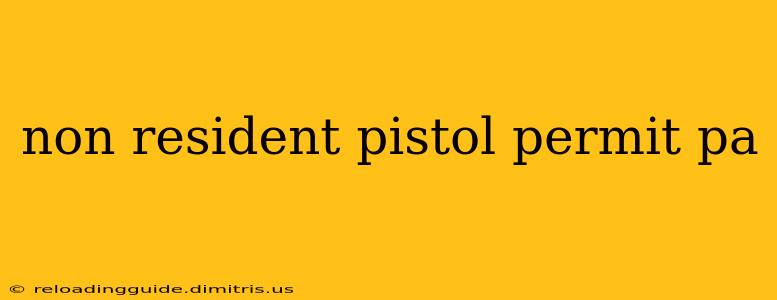Pennsylvania's firearm laws can be complex, particularly for non-residents seeking a pistol permit. This guide aims to clarify the process, outlining the requirements and procedures involved in obtaining a Pennsylvania non-resident pistol permit. Understanding these regulations is crucial for anyone wishing to legally possess a pistol within the state.
Eligibility Requirements for Non-Resident Pistol Permits in PA
Before delving into the application process, it's vital to confirm your eligibility. Pennsylvania's non-resident pistol permit requirements are stringent. You must meet all of the following criteria:
-
Legal Residency: You must be a resident of a state that reciprocates Pennsylvania's firearms laws. This means your home state must allow Pennsylvania residents to legally possess firearms under similar conditions. Crucially, this reciprocity is not automatic and needs to be independently verified. Contact the Pennsylvania State Police for a current list of reciprocal states.
-
Age: You must be at least 21 years old.
-
Legal Status: You must be a U.S. citizen or a legal alien lawfully residing in the United States. Providing proper documentation is essential.
-
Background Check: You must pass a thorough background check conducted by the Pennsylvania State Police. This includes fingerprinting and a review of your criminal history. Any felony convictions or certain misdemeanor convictions will likely disqualify you.
-
Good Moral Character: Pennsylvania emphasizes "good moral character." This is a subjective assessment, and the issuing authority will review your application holistically, considering factors like past conduct and any involvement in criminal activity.
-
Pennsylvania Connection (Often Misunderstood): While not a strict residency requirement, you will typically need to demonstrate a legitimate reason for needing a Pennsylvania pistol permit. This often involves activities like hunting, target shooting at approved ranges, or participation in recognized shooting competitions within the state. Vague or insufficient justifications can lead to application denial.
The Application Process: Steps to Follow
The application process involves several steps, and meticulous attention to detail is vital. Failure to provide complete and accurate information will result in delays or rejection.
1. Secure Necessary Documents:
Gather all required documentation, including proof of identity, residency (in your home state), age, and any relevant Pennsylvania-specific justification for needing a pistol permit. This might include range memberships, hunting licenses, or competition registration details. Ensure all documents are certified copies where required.
2. Complete the Application Form:
Download and carefully complete the Pennsylvania non-resident pistol permit application form. This form requires detailed personal information, including your criminal history. Accuracy is paramount.
3. Fingerprinting:
You'll need to undergo fingerprinting at an approved location. The Pennsylvania State Police website should provide a list of authorized fingerprint providers.
4. Submit Your Application:
Submit your completed application, supporting documents, and fingerprints to the relevant Pennsylvania County Sheriff or Police Department. The specific procedure may vary slightly depending on the county. Contact the relevant authority directly to inquire about specific requirements and submission methods.
5. Background Check & Processing:
The Pennsylvania State Police will conduct a comprehensive background check. This process can take several weeks or even months. Patience is required.
6. Issuance (or Denial):
Upon successful completion of the background check and review of your application, you may receive your non-resident pistol permit. If your application is denied, you'll receive notification outlining the reasons for the denial.
Seeking Legal Counsel
The laws surrounding firearm ownership are intricate and often subject to interpretation. If you have any doubts or concerns about your eligibility or the application process, it's strongly recommended to consult with a legal professional specializing in Pennsylvania firearms law. They can provide valuable guidance and assistance to navigate the complexities of obtaining a non-resident pistol permit.
This guide provides a general overview. Always consult the official Pennsylvania State Police website and relevant county authorities for the most up-to-date and accurate information. The information provided here is for informational purposes only and does not constitute legal advice.

